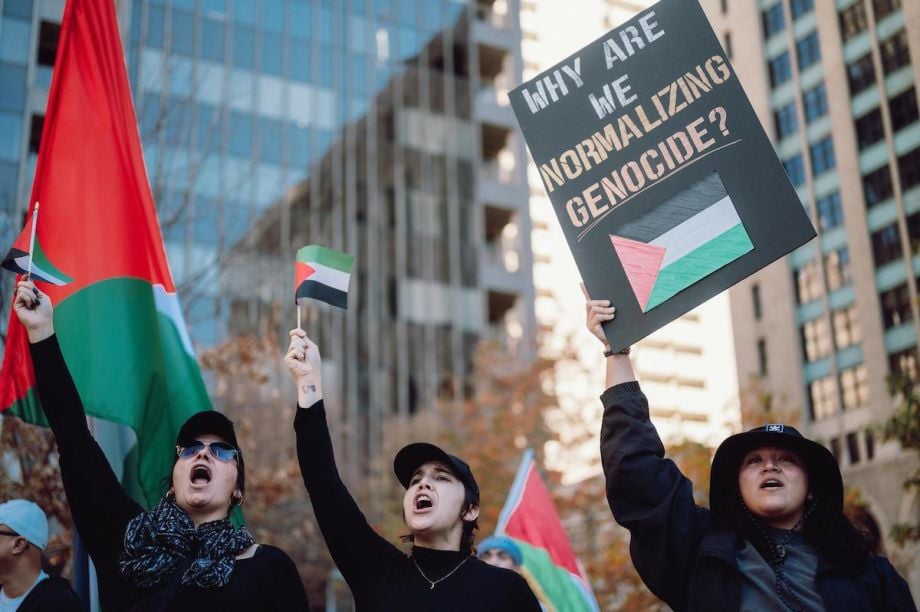Have you heard about Next City’s virtual film festival? It’s happening next week. Sign up to join us or send the link to someone you think would be interested in watching these films that show how people are responding to the most pressing climate issues of our time. Each screening will be followed by a Q&A with the director of the film.
Also, we extended the deadline for our annual Vanguard conference, taking place in Lexington this September. Submit your application by May 31 at 11:59 p.m. Eastern!
The Best Response to Student Protests Is Anything But Police
While some university administrators chose to immediately crack down on student protestors opposing the genocide in Gaza and the West Bank — in some cases beating, tear-gassing them and shooting them with rubber bullets — other schools like Brown and Northwestern either negotiated with protestors or reached deals to end encampments, according to Vox.
Evergreen College conceded to some protestor demands, including no longer offering study abroad in “regions where our students are denied entry based on their identity as Palestinians or Jews.” (Evergreen is the alma mater of Rachel Corrie, the 23-year-old American citizen who was crushed by an Israeli bulldozer in Rafah in 2003 while protecting the home of a Palestinian family.) At Brown, the encampment was cleared after the university agreed to a vote on divestment. According to Vox’s Abdallah Fayyad, “There’s a simple way for universities to handle these protests: Treat them like other protests.” As Israeli forces seized the Rafah crossing and began bombing residential areas, faculty at the New School set up an encampment and called for divestment from Israel.
Chicago Issues Billion-Dollar Housing Bond
Chicago’s City Council has approved a $1.25 billion bond to fund new housing and economic development. The bonds would be backed by increased property tax revenue from expiring tax incremental financing, which allows cities to pay for projects by pledging future property taxes. Shifting to bond financing from TIF financing — 40 TIF districts in Chicago are set to expire in the coming years — is a sea change for the city. As the Chicago Reader notes, the city has used TIF disproportionately compared to other cities, allowing for a “shadow budget” outside the typical budget process, which “primarily funds improvement projects in thriving neighborhoods,” according to a 2009 Reader investigation. But bonds can also be risky as they require interest payments to bond purchasers, even as cities have been using them more in recent years. Among the programs funded by Chicago’s bond measure is a “Green Social Housing Revolving Fund,” which offers low-cost loans to developers who must sell the properties back to the city after construction. The fund could build 600 units of city-owned units every five years. (But it would still take more than 15 years to make up for the amount of public housing taken offline as the result of a federal program that incentivizes vacancies.)
New York’s Limited Basement Legalization Pilot
New York’s latest budget includes funding for a basement legalization pilot program, but it does not include neighborhoods where several residents died as a result of Hurricane Ida in 2021. State senator Julia Salazar and Assemblymember Jessica González-Rojas say they will introduce a bill to expand the program to their districts: it would include Cypress Hills, where a previous citywide basement legalization pilot was defunded in 2020, and Elmhurst, where several people died during severe flooding in 2021. Thousands of people, mostly in New York City, reside in basement units illegally converted into housing units that are often unsafe, particularly during fires or flooding.
Black Home Values Increased Over Last Decade
According to Stateline, property values grew by 84% in majority Black zip codes between 2016 and 2023. Home values grew 69% in White zip codes during the same time period. According to an April University of Michigan study, Black homeowners in Detroit alone gained $3 billion in wealth between 2014 and 2022. The increase has been attributed to states closing the gap in appraisal bias, the shift to remote work, and home values in Black neighborhoods resetting after being undervalued during the Great Recession. The increase also stems from the overall shortage of single-family homes, which has contributed to spiking rents across the country. The increase in property values is a big shift from prior years: a 2015 study from Johns Hopkins found that in the 2000s, most Black homeowners lost wealth when their property values decreased and would have been better off renting.
Students in Harlem To Receive $10,000 Investment Funds
The New York Times reports that thousands of children in Harlem will receive $10,000 each in investment accounts thanks to a nonprofit called Harlem Children’s Zone, which is raising $300 million for the program from wealthy philanthropists. The money would be available to young people when they turn 25 and would have to be used for education, home down payments or business investments. The nonprofit said it has enough funds for all 2,200 students at the two charter schools it operates. It eventually plans to fund 5,000 students in Harlem and another 5,000 in other cities across the country. It estimates that the $10,000 could gain 5% interest a year and be worth $26,000 by the time young people can access the money. The nonprofit hopes to build support for a publicly-funded version of the program, similar to the idea of “baby bonds” that some cities have been adopting.
Curated by Deonna Anderson
MORE NEWS
-
The National Writers Union released a report this week that examines retaliation in the media industry during the war on Gaza. (Disclosure: Roshan Abraham who writes the briefs for this newsletter was one of the more than two dozen worker-organizers who contributed to the report.) Access the report here.
-
Detroit City Council has approved the creation of a tenants’ rights commission to represent and advocate for residential renters. Bridge Detroit
-
Sacramento State University has implemented “responsible investing” policies and is set to officially start divesting from corporations that profit from genocide, ethnic cleansing, or that violate human rights. CapRadio
-
Churches tied to Civil Rights were awarded $23.4 million in National Park Service preservation funds. Religion News
OPPORTUNITIES
-
The Lincoln Institute of Land Policy and Claremont Lincoln University are accepting applications for the inaugural cohort of fellows for their Lincoln Vibrant Communities initiative. During the six-month program, they will partner with U.S. municipalities “to address common, complex challenges facing counties and cities, with a focus on investing in leadership, policy, and advanced public sector practice skills required to build vibrant, engaged communities.” The deadline to apply is June 11. Learn more here.
EVENTS
-
Beginning May 15: The Los Angeles Food Policy Council (LAFPC) is hosting an event series titled LA Foodscapes: Conversations at the Intersections of Food, People, and the Land. Learn more about each event (and register) here.
-
Need some inspiration for your work? Peruse the Next City event archive.
This article is part of The Weekly Wrap, a newsletter rounding up stories that explain the problems oppressing people in cities and elevate the solutions bringing us closer to economic, environmental and social justice. Click here to subscribe to The Weekly Wrap newsletter.

Roshan Abraham is Next City's housing correspondent and a former Equitable Cities fellow. He is based in Queens. Follow him on Twitter at @roshantone.



















Add to the Discussion
Next City sustaining members can comment on our stories. Keep the discussion going! Join our community of engaged members by donating today.
Already a sustaining member? Login here.